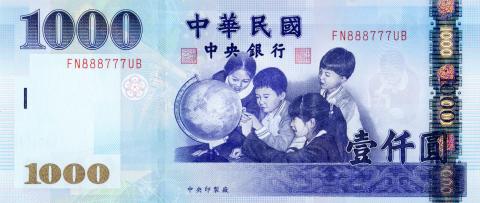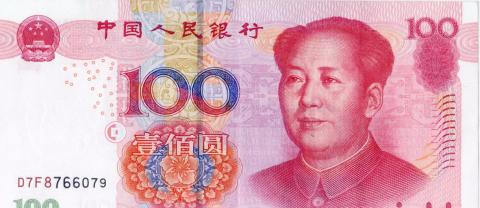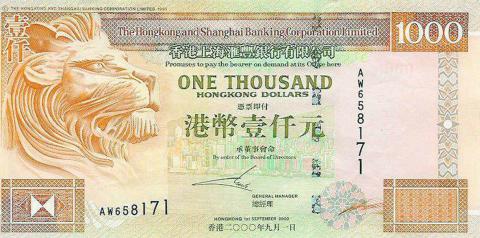A Greater Taichung man’s contention that the nation’s most common bills in circulation contain a printing error that has gone unnoticed for decades has sparked a heated debate.
Huang Pai-tsun (黃百村), a bedding merchant, said that the Chinese character for “one” (yi, 壹) on all NT$100 and NT$1,000 banknotes is incorrect.
The upper part of the character yi should be shi (士, scholar), with the top horizontal stroke longer than the bottom one, Huang said.

Photo: Lin Liang-che, Taipei Times
However, the banknotes in circulation have it wrong, he said, with the character written as tu (土, land or earth), which has a top horizontal stroke that is shorter than the bottom one.
Huang said he has double-checked with standard Chinese dictionaries and computer word processors and verified that the banknotes contain a misprint.
However, an official from the central bank’s currency issuance department denied that it was a misprint.

Photo: Lin Liang-che, Taipei Times
“There is no mistake in the Chinese character on the bills,” the official said.
Officials from the central bank’s Central Engraving and Printing Plant added that the printed characters on the currency bills were designed specifically for aesthetic purposes and to guard against counterfeiting, and, as such, differ from the regular written form.
“All printed characters on the bills were uniquely designed. If they were the same as those printed by a computer, then the bills would be easy to counterfeit,” an official said.

Photo: Lin Liang-che, Taipei Times
Yang Meng-chu (楊孟珠), a Chinese-language teacher at a senior-high school in Greater Taichung, is unconvinced, saying she thinks the central bank is wrong.
According to the Kangxi Dictionary (康熙字典), the root character for yi is shi; the central bank has therefore made a blunder by misprinting the root character as tu, Yang said.
A look at banknotes containing the character yi in China, Hong Kong and Macau show that they are printed with the root character shi.
“The Taiwanese government has always stressed that we are a country that uses the traditional Chinese system of writing. We should therefore be careful to follow the proper form,” Huang said.
“The central bank has made an error on the circulating bills. This has become an international joke. As China, Hong Kong and Macau all use the correct Han Chinese form, I want to see the central bank rectify the error at once. We should not allow this mistake to continue,” he added.
Money collector Yang Chuan-ming (楊川明) appeared to support Huang’s findings, saying he had made a careful study of all banknotes issued from the Japanese colonial era to the period right after World War II and found that all were written in the proper form.
“However, the [print] on the bills issued by the Chinese Nationalist Party (KMT) government starting from 1949 were all changed to tu,” he said.
In 1949, the KMT government had to deal with several crises, including soaring inflation and social unrest, and had to undertake a major fiscal restructuring, Yang Chuan-ming said.
“That was the time the KMT government mandated the conversion of one New Taiwan dollar for every 40,000 old Taiwan dollars. It was the start of the New Taiwan currency, with the issuance of NT$0.01, NT$0.10 and NT$100,” he said.
“From then on, the yi character on currency bills almost all had the wrong root on top. Very few bills got it right since then,” he said.

‘DENIAL DEFENSE’: The US would increase its military presence with uncrewed ships, and submarines, while boosting defense in the Indo-Pacific, a Pete Hegseth memo said The US is reorienting its military strategy to focus primarily on deterring a potential Chinese invasion of Taiwan, a memo signed by US Secretary of Defense Pete Hegseth showed. The memo also called on Taiwan to increase its defense spending. The document, known as the “Interim National Defense Strategic Guidance,” was distributed this month and detailed the national defense plans of US President Donald Trump’s administration, an article in the Washington Post said on Saturday. It outlines how the US can prepare for a potential war with China and defend itself from threats in the “near abroad,” including Greenland and the Panama

The High Prosecutors’ Office yesterday withdrew an appeal against the acquittal of a former bank manager 22 years after his death, marking Taiwan’s first instance of prosecutors rendering posthumous justice to a wrongfully convicted defendant. Chu Ching-en (諸慶恩) — formerly a manager at the Taipei branch of BNP Paribas — was in 1999 accused by Weng Mao-chung (翁茂鍾), then-president of Chia Her Industrial Co, of forging a request for a fixed deposit of US$10 million by I-Hwa Industrial Co, a subsidiary of Chia Her, which was used as collateral. Chu was ruled not guilty in the first trial, but was found guilty

A wild live dugong was found in Taiwan for the first time in 88 years, after it was accidentally caught by a fisher’s net on Tuesday in Yilan County’s Fenniaolin (粉鳥林). This is the first sighting of the species in Taiwan since 1937, having already been considered “extinct” in the country and considered as “vulnerable” by the International Union for Conservation of Nature. A fisher surnamed Chen (陳) went to Fenniaolin to collect the fish in his netting, but instead caught a 3m long, 500kg dugong. The fisher released the animal back into the wild, not realizing it was an endangered species at

DEADLOCK: As the commission is unable to forum a quorum to review license renewal applications, the channel operators are not at fault and can air past their license date The National Communications Commission (NCC) yesterday said that the Public Television Service (PTS) and 36 other television and radio broadcasters could continue airing, despite the commission’s inability to meet a quorum to review their license renewal applications. The licenses of PTS and the other channels are set to expire between this month and June. The National Communications Commission Organization Act (國家通訊傳播委員會組織法) stipulates that the commission must meet the mandated quorum of four to hold a valid meeting. The seven-member commission currently has only three commissioners. “We have informed the channel operators of the progress we have made in reviewing their license renewal applications, and